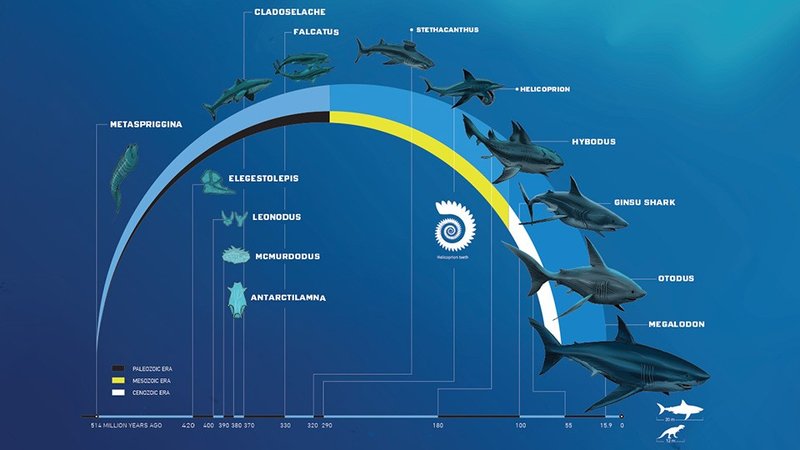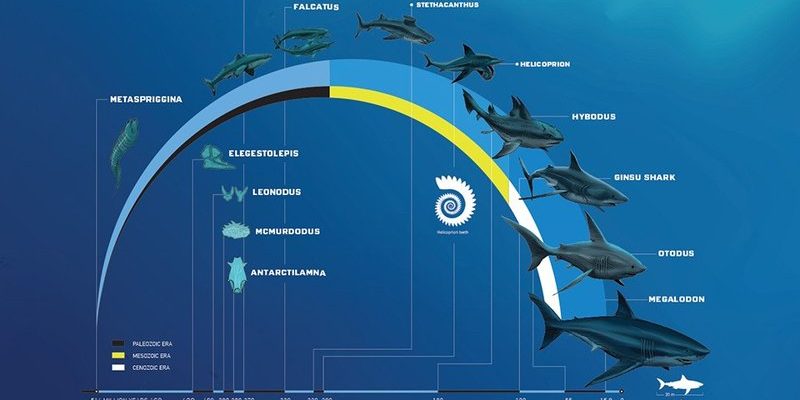
Whale sharks are the largest fish in the sea, but don’t let that fool you; they’re as gentle as they come. Unlike their more ferocious cousins, they skim the surface, filtering tiny creatures like plankton, much like a whale sifting through water. Their journey from ancient fish to the modern marvel we see today is a tale that intertwines with the history of our planet. Let me take you through this exciting evolutionary path, exploring how these gentle giants came to be, what makes them unique, and why they’re vital to our marine ecosystems.
The Origins of the Whale Shark
The evolutionary trail of the whale shark stretches back over 60 million years, making them part of a group known as elasmobranchs, which includes all sharks and rays. What’s intriguing is that they belong to a family called Rhincodontidae, and their closest living relatives are the carpet sharks. You might be wondering, “What does this mean?” Essentially, it tells us that whale sharks have some pretty cool cousins in the ocean!
Fossil evidence reveals that whale sharks once roamed alongside dinosaurs. Imagine that! These ancient fish were diverse, and some species existed that are now long gone. Fossils show that whale sharks evolved during a time when the oceans were filled with an array of strange and fascinating creatures. It’s like a snapshot of underwater life from millions of years ago, with whale sharks being the gentle giants that survived through time.
Early Adaptations
Whale sharks have adapted remarkably well to their environments over millions of years. Their immense size is one of the most notable adaptations. Growing up to 40 feet long or more, their bulk allows them to travel vast distances in search of food. Picture a floating bus, slowly moving through the water. Their size isn’t just for show; it helps them avoid many predators and threats in the ocean.
Another fascinating adaptation is their filter-feeding system. Unlike many other sharks, whale sharks have developed specialized gill rakers—think of them as tiny nets that help trap plankton and small fish as they swim. With their wide mouths open, they’re like giant vacuum cleaners, effortlessly taking in water. This method of feeding allows them to thrive in various ocean habitats, from coastal waters to the open sea.
The Unique Features of Whale Sharks
Whale sharks aren’t just enormous; they’re stunningly beautiful too. Their skin is a unique blend of grayish-blue, adorned with a pattern of white spots and stripes. These markings aren’t just for decoration; they play a crucial role in their survival. Just like a snowflake, each whale shark has a distinctive pattern, which scientists use to identify and track individual sharks. It’s like having a personal ID number, but way cooler!
Besides their appearance, whale sharks have a remarkably calm demeanor. They’re known for being gentle and inquisitive, often allowing divers and snorkelers to swim alongside them. It’s a surreal experience, gliding through the water near such a massive creature, feeling both tiny and connected to something vast and ancient.
Behavior and Social Structure
You might wonder about the behavior of these gentle giants. Whale sharks are generally solitary creatures, though they sometimes gather in large numbers at feeding grounds. Imagine a buffet where everyone shows up for a feast! These gatherings can attract dozens of sharks, all feasting together in harmony.
Interestingly, studies suggest that they may also communicate with each other, albeit quietly. Researchers have observed them engaging in what looks like social interactions, which opens the door to understanding their behaviors better. These social aspects add to their allure, highlighting an unexpected complexity in their quiet lives.
The Role of Whale Sharks in Marine Ecosystems
Whale sharks play a crucial role in maintaining the health of marine ecosystems. By filtering out plankton and small fish, they help regulate the populations of these organisms, contributing to a balanced food web. You could say they’re like the gardeners of the sea, managing underwater life with their gentle feeding methods.
Additionally, their massive size allows them to travel and interact with different ocean environments. This movement helps facilitate nutrient cycling, as they consume and disperse various marine organisms. In essence, they’re not just big fish—they’re essential players in ocean health!
Conservation Challenges
Despite their importance, whale sharks face numerous threats, primarily from human activities. Overfishing, habitat destruction, and climate change are significant issues they contend with. Fishing nets, pollution, and marine traffic can endanger these gentle giants, often leading to injury or death.
Conservation efforts are critical for the survival of whale sharks. Many countries have implemented protective measures, including marine parks and restrictions on fishing practices. It’s a step in the right direction, but more awareness and actions are necessary. Honestly, we need to value these majestic beings for what they are: vital components of our ocean’s health.
Future of Whale Sharks
Looking ahead, the future of whale sharks depends on our collective actions. As we gather more knowledge about them, we can advocate for policies and practices that protect their habitats. Organizations worldwide are working tirelessly to track and study whale shark populations, uncovering more about their behaviors and biology. It’s like piecing together a giant puzzle, with each piece revealing more about these incredible creatures.
Every one of us can play a part in this journey, whether it’s through supporting sustainable seafood practices, participating in beach clean-ups, or simply spreading the word about the importance of protecting marine life. The more we understand and appreciate whale sharks, the better equipped we are to ensure their survival.
The evolutionary journey of the whale shark is a testament to nature’s extraordinary ability to adapt and thrive. From their ancient beginnings millions of years ago to their modern-day status as gentle giants of the sea, whale sharks have a story that captivates and inspires. As we continue to learn more about them, let’s cherish these magnificent creatures and work together to protect the delicate balance of our oceans.
So next time you think about the ocean, remember the whale shark gliding gracefully through the water, a reminder of the beauty and mystery of marine life. Isn’t it amazing how one creature can hold so much significance in the vast, blue expanse?

